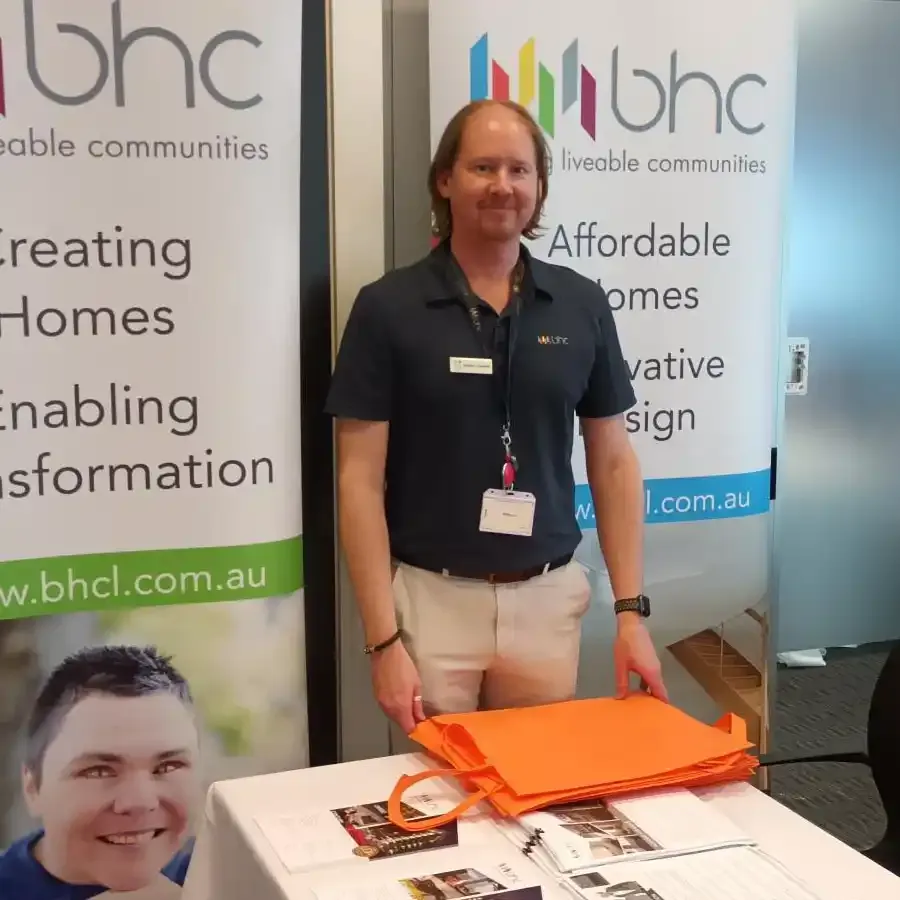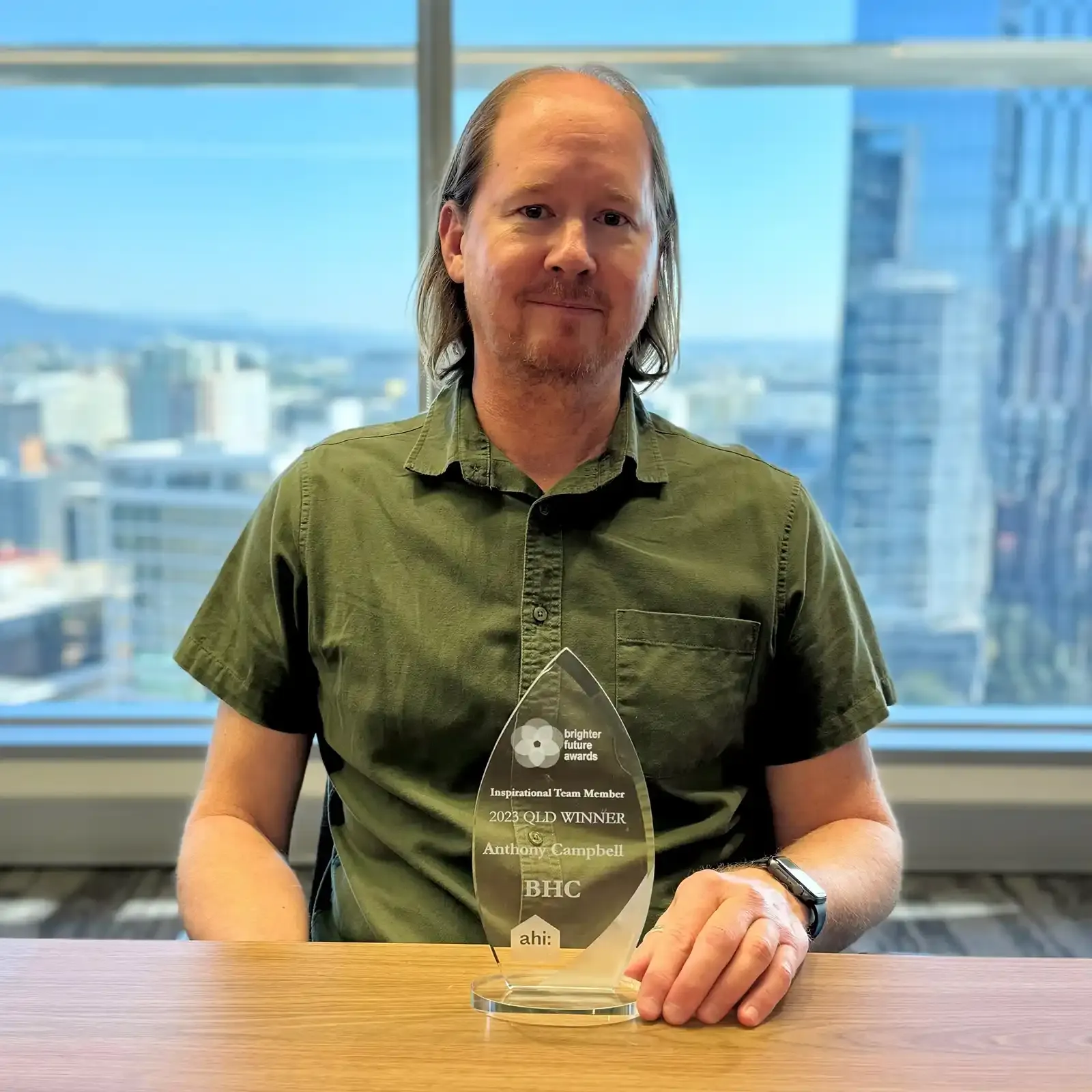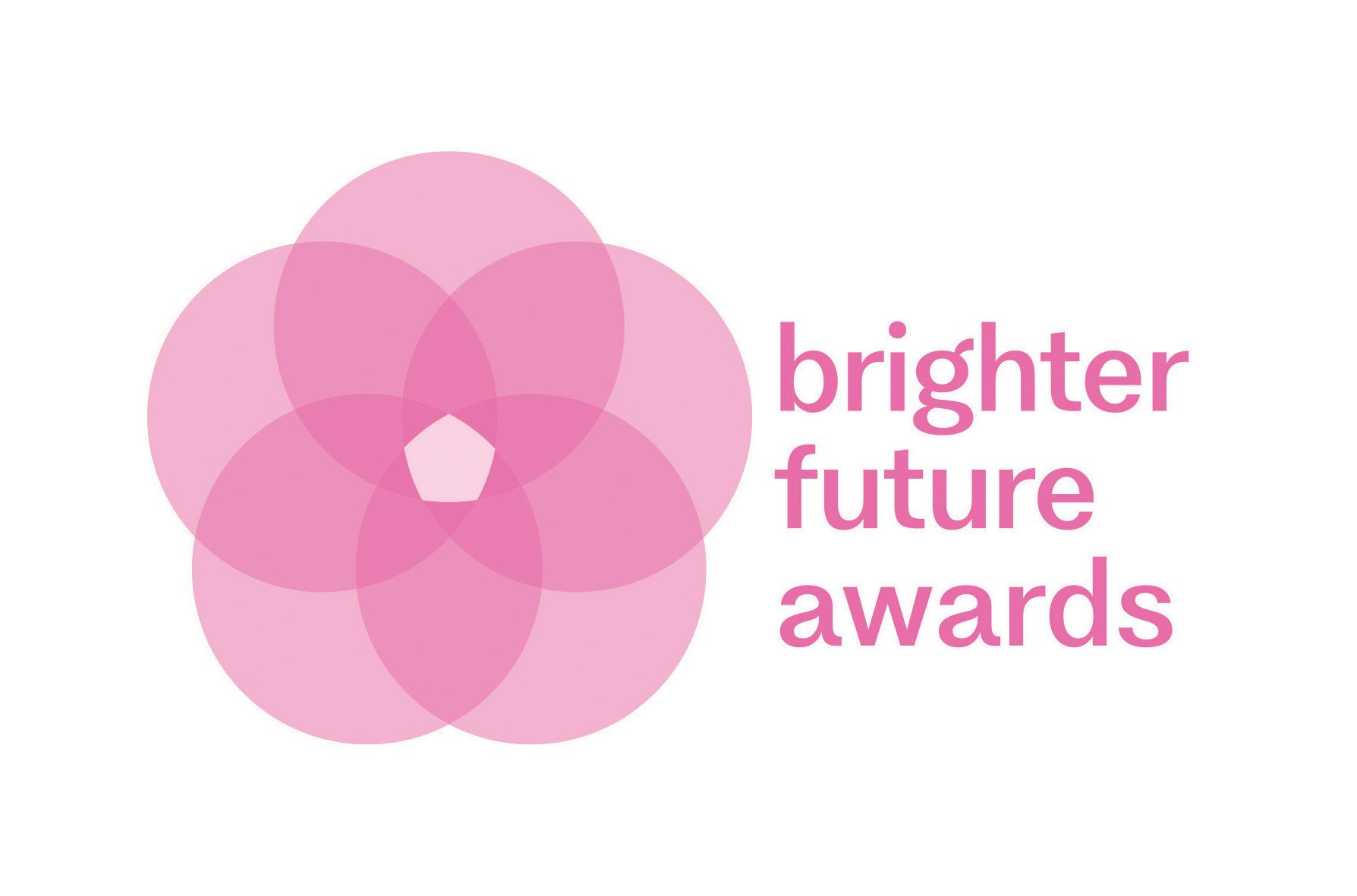ANTHONY CAMPBELL: ahi: Inspirational Team Member QLD
A self-professed "glass-half-full kind of person", Anthony Campbell is the latest addition to the ahi: Queensland’s Inspirational Team Member winners. He talks to HousingWORKS after collecting his Brighter Future award.
“When I see the amount of energy that people use up to be negative, and to be cranky and all of that sort of thing, I've trained myself not to be like that," says Anthony Campbell when expanding on his approach to work and life. "If you can turn negative energy around, not only do you make yourself feel good, but you make someone else feel good as well."
In his current position as Resident Participation and Employment Coordinator for Brisbane Housing Company (BHC), Anthony mentors residents in their search and application for jobs and volunteering opportunities, as well as uncovering training and education pathways that best suit their strengths and learning styles. You could say it's a position where having a positive attitude is a do-or-die job skill.
Although he’s new to the social and community housing sector, Anthony has been very successful working with Federal Government employment services in the past. The switch to BHC has been a source of inspiration for him itself.
“I was between jobs when I saw this position helping residents in social and affordable housing, and I thought, 'This looks like an amazing opportunity because I'd never seen it or read or heard about anything like it before. I pretty much jumped at the chance,” he says. “It's been really worthwhile being able to support our residents to achieve their goals and make positive choices and differences in their life. It's been fantastic.”
"Anthony freely admits the move into the social and affordable housing sector has been an eye-opener."
Having built a career in employment services, Anthony freely admits the move into the social and affordable housing sector has been an eye-opener, particularly when it comes to the role that secure housing plays in someone holding down a job.
“I didn't know a lot about BHC and social and affordable housing before I came here, but I quickly realised that it's not just someone paying their rent that sustains their tenancy,” he explains. “It's right across the board, making sure that everything’s linked in — good health and wellbeing services but also including employment opportunities if tenants want economic participation, social engagement or even intellectual stimulation through education and further training."
Anthony describes himself as someone who prefers to fly under the radar and focus on doing his job to the best of his abilities. So naturally, when he found out he’d been nominated for the Inspirational Team Member award, it hit him like a bombshell.
“There's a lot of amazing people that work here at BHC, so for me to be singled out and acknowledged for what I do for residents, it was a genuine surprise. But [I was] very happy to be acknowledged in that way."
"He’s seen even the simplest acts of encouragement and support boost a person’s self-esteem and confidence. It's a karmic ripple effect."
As already stated, positivity plays a major part in Anthony's philosophy on life because of the profound effects it can have on people. At work and in his personal time away from the desk, he’s seen even the simplest acts of encouragement and support boost a person’s self-esteem and confidence. It's a karmic ripple effect.
“Throughout my career where I've been engaging with people that have experienced negativity in their life and negativity either in their family, in their circumstances, or in their daily life, I've noticed the amount of energy it takes out of those individuals, having that negativity around them. For me, small doses of positivity and encouragement build up people’s self-esteem and confidence.”
“If you make someone feel good, then they may make someone feel good or it might encourage them to do other things that are positive within their life,” he continues. “Small amounts [of positivity] all add up over time, and they show a person you're engaging with them, and that they have a lot of positive things to contribute as opposed to just hearing negative things all the time."
Similarly, witnessing the passion his colleagues have for the work they do, and their enduring dedication to helping others, inspires him to do what he does––and to go that one step further.
“When I see the people I work with share that same passion in helping someone— regardless of how big or small or significant, or not significant, it is — providing that help and giving a positive outcome for someone at the end of the day is what inspires me,” Anthony says. “Putting a roof over people's heads, maintaining the roof over their head, providing opportunities for them, and then giving them the opportunity to thrive is what we're all passionate about at BHC."
There's also a satisfaction he gets from seeing residents getting back on their feet in the wake of major life setbacks, like a stint in prison or a significant mental health challenge.
As he explains, “I've been able to sit down with people and get to know them, and explore their strengths, and what they can do, as well as supporting them through the process of looking at careers, preparing for applying for jobs, coaching them during the interview process and supporting them with clothing and work gear and other things that are related to being able to sustain a period of employment."
"I get very excitable when I hear these great stories where residents have continued on in their life and maintained their employment. It inspires me to continue to do what I do."
"Watching them thrive in the job that they were successful in securing, and then transitioning from a boarding room to a studio apartment, which can be long-term, stable, safe and secure accommodation. Seeing their life go from one success to another is something that has inspired me and my colleagues," he continues. "I get very excitable when I hear these great stories where residents have continued on in their life and maintained their employment and all sorts of positive things that happen for them through being employed. It inspires me to continue to do what I do."
Today, the ahi: Brighter Future award for Inspirational Team Member sits proudly on Anthony’s desk as a reminder of the difference he's making on people's lives. It also serves as a reminder of the support he’s received from the wider BHC family.
“I love BHC as an employer, I love my colleagues and what we do for people” he concludes reflecting on the achievement. “So, it's something that I'm proud to have on my desk for people to see. It also reinforces the really good work that we all do within our team, and BHC as a whole, for people that desperately need a roof over their head at the moment."
The ahi: Brighter Future Awards will be taking place again in 2025
Other articles you may like

We acknowledge the Wathaurong, Yuin, Gulidjan, and Whadjuk people as the traditional owners of the land where our team work flexibly from their homes and office spaces. Ahi Australia recognises Aboriginal and Torres Strait Islander peoples as the first inhabitants of Australia and the traditional custodians of the lands where we live, learn and work. Ahi New Zealand acknowledges Māori as tangata whenua and Treaty of Waitangi partners in Aotearoa New Zealand.
Copyright © 2023 Australasian Housing Institute
site by mulcahymarketing.com.au







